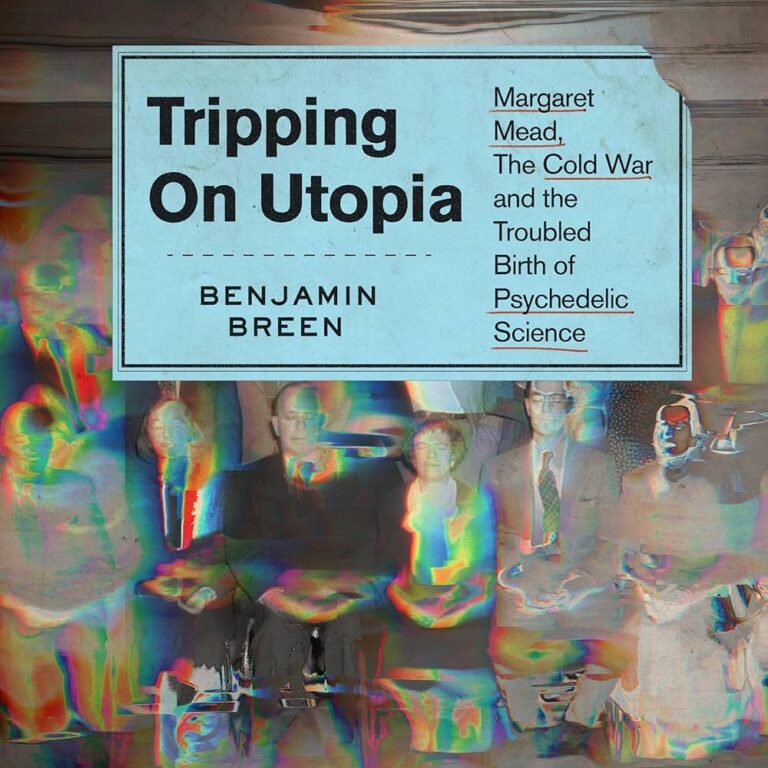Description
Tripping on Utopia: Margaret Mead, the Cold War, and the Troubled Birth of Psychedelic Science (Audible Audio Edition)
Unveiling the Story
Step into a world where the boundaries of science, culture, and consciousness intertwine in a captivating narrative that spans the tumultuous mid-20th century. “Tripping on Utopia” by Benjamin Breen offers a bold and brilliant revisionist perspective on the history of psychedelics, illuminating the pivotal role these substances played during the Cold War and the nascent days of Silicon Valley.
At the heart of this exploration are the iconic figures of Margaret Mead and Gregory Bateson, anthropologists whose groundbreaking research and passionate love affair challenged societal norms and government intentions. As we journey through their lives—ranging from the malarial jungles of New Guinea to the espionage of WWII—we uncover a complex tapestry of ambition, experimentation, and the quest for expanded consciousness. Breen’s masterful storytelling brings to life an era where transformative drugs were not only legal but celebrated, inviting readers to consider the implications of a culture eager to redefine reality.
What Makes It Stand Out
“Tripping on Utopia” stands out for several reasons:
- Interdisciplinary Approach: The book intricately weaves together the lives of Mead and Bateson with the historical context of psychedelic science, the Cold War, and institutional power struggles.
- Revisionist History: Breen offers a fresh lens on an often oversimplified narrative, highlighting the complexities of 20th-century drug experimentation and the figures behind it.
- Engaging Writing Style: Breen’s prose is both accessible and thought-provoking, making complex ideas digestible for a broad audience.
- Emphasis on Cultural Impact: The exploration of how psychedelics influenced not only scientific thought but also broader cultural movements adds depth to the narrative.
The Takeaway
Readers can expect to gain a multifaceted understanding of the interplay between psychedelics, culture, and science. The book challenges conventional perceptions of drug use and societal progress, encouraging reflection on how these elements shaped contemporary consciousness. Ultimately, “Tripping on Utopia” is not just a historical account but a thought-provoking examination of humanity’s quest for knowledge and understanding.
Who Should Consider This
This book is ideal for:
- Fans of Historical Non-Fiction: Those interested in the intersections of history, science, and culture will find much to appreciate.
- Readers of Anthropology and Psychology: Scholars and enthusiasts of Mead and Bateson’s work will gain new insights into their contributions.
- Curious Learners: Individuals looking to explore the complex narrative of psychedelics and their socio-political implications.
- Psychedelic Enthusiasts: Those familiar with or seeking to understand the cultural significance of psychedelics in the 20th century will find rich content here.
In-Depth Review
User feedback highlights the well-researched nature of “Tripping on Utopia,” praising Breen for combining biographical elements with critical historical analysis.
- Biographical Depth: The intertwining stories of Mead and Bateson are depicted with respect, allowing readers to appreciate their intellectual legacies without diminishing their humanity.
- Complex Relationships: The narrative captures the emotional and intellectual turmoil experienced by its central figures, though some readers noted that the backgrounds of these characters could feel rushed.
- Contextual Relevance: From the OSS to the CIA, the book adeptly navigates the complex web of Cold War psychology, providing historical context that enriches the understanding of contemporary issues.
- Diverse Perspectives: The book appeals to both those who are well-versed in the cultural landscape of the 1960s and those who are just beginning to explore these themes, offering multiple layers of engagement.
Pros and Cons
Pros
- Well-researched and engaging narrative.
- Unique blend of biography and history.
- Thought-provoking insights into the cultural impact of psychedelics.
Cons
- Some readers may find character backgrounds insufficiently developed.
- The complex narrative may be challenging for those unfamiliar with the historical context.
Discover More
Dive deeper into the rich tapestry of “Tripping on Utopia” and uncover the profound connections between psychedelics, culture, and history. Benjamin Breen’s compelling narrative invites you to rethink the role of experimental drugs in shaping our world. Experience this captivating audiobook today and explore the untold stories that have shaped modern consciousness.










Reviews
There are no reviews yet.